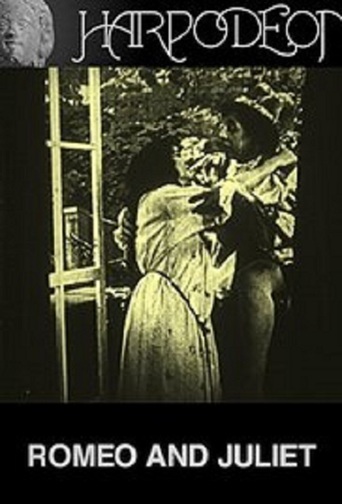

Good start, but then it gets ruined
... View MoreEach character in this movie — down to the smallest one — is an individual rather than a type, prone to spontaneous changes of mood and sometimes amusing outbursts of pettiness or ill humor.
... View MoreIt really made me laugh, but for some moments I was tearing up because I could relate so much.
... View MoreThis is a small, humorous movie in some ways, but it has a huge heart. What a nice experience.
... View MoreROMEO AND JULIET is an early filmed version of the Shakespeare play notable for being the first attempt at a two-reel production. The version I watched, by Harpodeon, only has the second reel available, so it's all about tragedy here along with a brief sword fight at the outset. Romeo and Juliet have already got together by this point, but Romeo is caught up between the warring families before he discovers that a terrible tragedy has occurred.It's a handsomely mounted thing that manages to get all of the Shakespearian aspects dead right, and it says something that the linear structure and storytelling aspect is such that the story is instantly recognisable and - crucially - understandable to any viewer, no matter the age in which they watch it.
... View MoreThis is the first attempt of an Independent manufacturer to produce a two-reel attraction. The subject was well chosen, for "age cannot wither nor custom stale" the deathless charm of Shakespeare. "Romeo and Juliet" has been rendered into moving pictures before, more than two years ago by the Vitagraph Company. The film of the Vitagraph Companey possesses rare merit, but the present production has a great advantage; it has more space for the telling of the story, two thousand feet instead of only one thousand. Nothing could better illustrate the advantage of the two-reel over the one-reel film than a comparison between the productions of these two companies. The Vitagraph story was exceedingly well told, the acting was superb, the settings magnificent, the adaptation clever. The two reels production, however, makes the story plainer to a person who has never read the classic tragedy. It is creditable to the maker of this present film that each of the reels tells a story of its own; one the love story, the other the tragedy. As the reels are issued at different times this will help the exhibitor. Someday it is to be hoped an arrangement will be made which allows of such productions being released at the same time, the only sensible and logical way. The Thanhouser adaptation is the work of skilled and conscientious effort and makes the story very plain to every grade of intelligence, a merit which cannot be estimated too highly. All the classic figures in the play are well individualized, from Romeo and Juliet to the smallest character. This individualization extends to the matter of costumes as well; indeed, in this regard the present production leaves no room for adverse criticism. This is much to be lauded, for in a Shakespearian classic above all things, proper costuming is an essential part of the right atmosphere. The settings, especially the out-door scenes, are very happily chosen and arranged, and lend much charm to the production. Owing to the fact that the film maker had two reels in which to tell the story, he was able to give much space to the opening scenes, which make it so much easier to grasp and follow the story. The choosing of these scenes was dictated by art and good taste. Just praise must be given to the acting, which was well up to the general fine standard of the whole production. - The Moving Picture World, August 19, 1911
... View MoreThough the first reel no longer exists, what remains of this early film version of Shakespeare's romantic tragedy is interesting and beautifully produced. The sets are lavish and the costumes are gorgeous to look at.The acting is very much of the 19th century acting school, common in early silent film, until a more naturalistic style took over in the middle of the 1910s. Out of everyone in the cast, Julia M. Taylor makes the biggest impression as Juliet Capulet. She does indulge in some overacting (especially during the scene where she takes the drug which will put her into a temporary coma, where she stumbles about waving her arms), but she possesses a girlish loveliness which suits her to the role.Early cinema fans will find a lot to appreciate here.
... View More